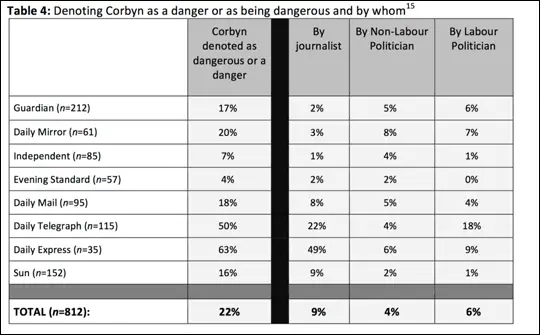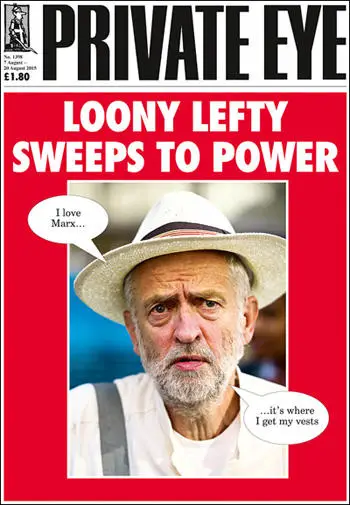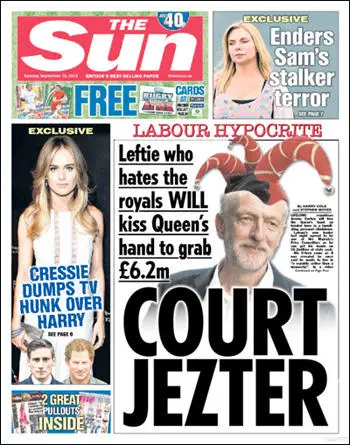Spartacus Blog
The Media and Jeremy Corbyn

I first became interested in politics in 1963 and I soon discovered that the British media was extremely hostile to left-wing ideas. However, I thought at the time the some aspects of the media, especially the Guardian and the BBC, would at least provide some sort of fairness in its reporting. That might have been true in my youth but not in today's world.
Most of the time you do not notice it. It is only when you have situations where the status quo is really being threatened that this becomes clear. In reality, in times of crisis, mainstream media organizations will always report the news in a way that is beneficial to the ruling elite.
In his book on the the 1926 General Strike, the historian Christopher Farman, studied the way the media dealt with this important industrial dispute. John Colin Campbell Davidson, the Chairman of the Conservative Party, was given responsibility for the way the media should report the strike. "As soon as it became evident that newspaper production would be affected by the strike, Davidson arranged to bring the British Broadcasting Company under his effective control... no news was broadcast during the crisis until it had first been personality vetted by Davidson... Each of the five daily news bulletins plus a daily 'appreciation of the situation', which took the place of newspaper editorials, were drafted by Gladstone Murray in conjunction with Munro and then submitted to Davidson for his approval before being transmitted from the BBC's London station at Savoy Hill." (1)
This propaganda operation was highly successful and very few people realised the BBC was distorting the news. This was even true of people who should have known better. The left-wing Labour Party MP, Ellen Wilkinson, had a letter published in the Radio Times thanking the BBC for the "admirable part their organization has played during the recent happily-ended strike". Wilkinson then went on to argue: "By the sending out of trustworthy news, and by the prompt denial of false rumours, the pulse of the country was kept calm and healthy... Both sides of the dispute ought to be grateful to the organizers of this new means of spreading intelligence." (2)
John Reith, the BBC's managing director, was someone who did know the way the news had been distorted during the strike. Reith was very unhappy about the situation as he made clear in a confidential letter that he wrote to senior BBC staff at the end of the dispute. "The attitude of the BBC during the crisis caused pain and indignation to many subscribers. I travelled by car over two thousand miles during the strike and addressed very many meetings. Everywhere the complaints were bitter that a national service subscribed to by every class should have given only one side during the dispute. Personally, I feel like asking the Postmaster-General for my licence fee back." (3)
If the BBC does not follow the party line it will be punished. Although it acted as the main cheerleader for the Iraq War, it created great controversy when its reporter, Andrew Gilligan, claimed on BBC Radio 4's The Today Programme, that a British government briefing paper on Iraq and weapons of mass destruction had been "sexed up" in order to exaggerate the WMD capabilities of Saddam Hussein. (4)
We now know that the BBC report was accurate, but following the publication of the Hutton Report, that questioned the reliability of Gilligan's evidence, he was forced to resign. So also was Greg Dyke, the Director-General of the BBC and Gavyn Davies, the chairman of the BBC. This was a warning to any other BBC journalist not to criticise governments too strongly.
It seems in recent months that we are facing another political crisis that needs a united media offensive against a common enemy. This is of course the emergence of a highly dangerous politician, Jeremy Corbyn. A report into this has just been carried out by the London School of Economics and Political Science. In its report, Journalistic Representations of Jeremy Corbyn in the Mainstream Press: From Watchdog to Attackdog, it heavily criticises the way Corbyn has been treated in the media.
"The study set out to empirically analyse the nature of the media representation of Jeremy Corbyn in 8 British newspapers from 1 September – 1 November 2015. First, it distinguishes between critical reporting and what we call antagonistic reporting. Second, it aims to demonstrate and assess the ways in which the British press systematically delegitimised Jeremy Corbyn as a political leader. The results of this study show that Jeremy Corbyn was represented unfairly by the British press through a process of vilification that went well beyond the normal limits of fair debate and disagreement in a democracy."
The report points out that media organizations appear to be nearly in complete agreement on the merits of Jeremy Corbyn: "Journalists and commentators describe the Labour leader and his political ideas as ‘loony’, ‘unrealistic’, or ‘outdated’. Right wing newspapers, such as The Daily Telegraph, and tabloids like The Daily Express and The Sun, emphasised the supposed ‘radicalism’ and ‘insane’ nature of his political proposals. Besides describing left wing ideas as loony, they are also seen as unrealistic and highly unlikely to deliver an election victory to Labour, something the left wing and liberal newspapers also picks up on."

One of the concerns of this report is the role played by so-called left of cenre newspapers such as the the The Daily Mirror (see table above). The report argues that, 56% of the articles analysed about Corbyn do not give Corbyn a voice at all. The media is also criticised for giving a more prominent voice to Labour opponents of Corbyn. "In many newspapers the voice of Labour sources that are against Corbyn outweigh those that are supporting him. This is especially the case in The Independent, The Daily Telegraph and The Daily Express, but also in the left wing tabloid The Daily Mirror." (5)
Understandably, most of the newspapers ignored this study. It was good to see The Independent was brave enough to publish details of the Journalistic Representations of Jeremy Corbyn in the Mainstream Press: From Watchdog to Attackdog. "Three-quarters of newspaper stories about Jeremy Corbyn in the first months of his leadership either distorted or failed to represent his actual views on subjects, a study has found. The media researchers found that in 52 per cent of articles about the Labour leader, his own views were not included – while in a further 22 per cent they were “present but taken out of context” or otherwise distorted. In just 15 per cent of 812 articles analysed, Mr Corbyn’s views were present but challenged, and in only 11 per cent were they present without alteration." (6)
As readers of The Guardian are only too aware, it is not only the right-wing newspapers that are involved in the campaign against the Labour leader. As its letters page show, Private Eye readers have also been upset by its anti-Corbyn reporting. However, it found it difficult not to highlight the Guardian's efforts against the Labour leader. It claims that its coverage has not been as hostile as it would like it to be. It quotes a Guardian journalist as saying: "There's a lot of censorship and self-censorship. It's like Henry II and Thomas Beckett. No one quite knows what the editor wants them to do."

The magazine examines a Guardian editorial where it said that Corbyn was "no longer leading at all" because he had lost the support of his colleagues, but it "couldn't find the courage to state plainly that he should resign". Private Eye argues that the reason for this is the "Guardian's marketing department handed senior journalists a survey of 5,000 Labour-supporting readers, which showed they support Corbyn overwhelmingly". (7)
This is clearly a problem for the Guardian as it continues to lose readers at an alarming-rate and it is no doubt partly due to its move to the right over the last few years. This is no surprise when you look at who owns the Guardian. It constantly talks about being owned by the Scott Trust. In reality, the ownership structure of the newspaper changed in 2008. As Jonathan Cook points out: "Though not a trust at all, but simply a profit-making company, it is still referred to frequently as ‘The Scott Trust,’ promulgating the widely-held but mistaken belief in the Guardian’s inherently benign ownership structure… The problem, of course, is that the Guardian functions under the same sort of corporate structure as any other major media company." (8)
Over the last few years the Scott Trust has been removing journalists with a liberal background, such as former editor Alan Rusbridger, and replacing them with right-wing businessmen. Nafeez Ahmed, an investigative reporter fired by the Guardian for his work exposing the connection between Israel’s attacks on Gaza and its interests in Gaza’s natural resources, has carried out research into the new board members. For example, he takes a close look at the CV of Anthony Salz: "A senior investment banker and executive vice chairman of Rothschild, and a director at NM Rothschild and Sons. He was a key legal adviser to Guinness during the notorious share-rigging scandal, helped Rupert Murdoch form BSkyB, and was vice chair of the BBC’s Board of Governors before it was replaced by the BBC Trust. He was also lead non-executive director of the board at the Department for Education under arch-neoconservative Michael Gove. Until 2006, Salz led a highly successful 30 year career as a corporate lawyer at Freshfields Bruckhaus Deringer, where he was head and senior managing partner since 1996." (9)
It is no wonder that the Guardian can no longer be trusted to report the news in a responsible way and will no doubt lose most of its left-wing readers in the near future. They will in future rely on online sources such as The Canary for their information. Even those with less committed political views will be more cautious about accepting the truth of material in mainstream publications.
The scale of the attack on Corbyn has increased since Peter Mandelson called for Corbyn to be removed on the morning after the EU Referendum took place. Although his critics often say Corbyn is a man of integrity he is "unelectable". This seems to have entered the public consciousness. Nearly every conversation I have had on the subject involves people saying that Corbyn is a "decent man but is unelectable".

However, the evidence does not show that this is the case. Corbyn seems to be popular with the Labour membership for in September 2015 he won 59.5% of first-preference votes, out of an electorate of 554,272. Corbyn has pointed out that the media and mainstream politicians have not yet fully grasped the changes that are taking place in society. "The media and many of us, simply didn’t understand the views of young people in our country. They were turned off by the way politics was being conducted. We have to and must change that. The fight back gathers speed and gathers pace". (10)
The Labour Party has always had a problem of a hostile media during election campaigns. This has not stopped them winning in 1945, 1950, 1964 and 1970. Of course, if you are willing to put forward the sort of centrist political programme favoured by Tony Blair, you can even get some of the newspapers to support you. The important question is has the coming of the internet changed the way we understand the world. If that is the case, then the ruling elite should start to get worried. (17th July, 2016)
References
(1) Christopher Farman, The General Strike: Britain's Aborted Revolution? (1972) page 183
(2) Ellen Wilkinson, letter published in the Radio Times (28th May, 1926)
(3) John Reith, letter to senior BBC staff (May 1926)
(4) Andrew Gilligan, The Today Programme (29th May, 2003)
(5) Journalistic Representations of Jeremy Corbyn in the Mainstream Press: From Watchdog to Attackdog (July, 2016)
(6) The Independent (17th July, 2016)
(7) Private Eye (8th July - 21st July, 2016)
(8) Jonathan Cook, HSBC and the sham of Guardian’s Scott Trust (3rd March, 2015)
(9) Nafeez Ahmed, Death Drugs and the HSBC (2nd March, 2015)
(10) The Guardian (12th September, 2015)
Previous Posts
The Media and Jeremy Corbyn (25th July, 2016)
Rupert Murdoch appoints a new prime minister (12th July, 2016)
George Orwell would have voted to leave the European Union (22nd June, 2016)
Is the European Union like the Roman Empire? (11th June, 2016)
Is it possible to be an objective history teacher? (18th May, 2016)
Women Levellers: The Campaign for Equality in the 1640s (12th May, 2016)
The Reichstag Fire was not a Nazi Conspiracy: Historians Interpreting the Past (12th April, 2016)
Why did Emmeline and Christabel Pankhurst join the Conservative Party? (23rd March, 2016)
Mikhail Koltsov and Boris Efimov - Political Idealism and Survival (3rd March, 2016)
Why the name Spartacus Educational? (23rd February, 2016)
Right-wing infiltration of the BBC (1st February, 2016)
Bert Trautmann, a committed Nazi who became a British hero (13th January, 2016)
Frank Foley, a Christian worth remembering at Christmas (24th December, 2015)
How did governments react to the Jewish Migration Crisis in December, 1938? (17th December, 2015)
Does going to war help the careers of politicians? (2nd December, 2015)
Art and Politics: The Work of John Heartfield (18th November, 2015)
The People we should be remembering on Remembrance Sunday (7th November, 2015)
Why Suffragette is a reactionary movie (21st October, 2015)
Volkswagen and Nazi Germany (1st October, 2015)
David Cameron's Trade Union Act and fascism in Europe (23rd September, 2015)
The problems of appearing in a BBC documentary (17th September, 2015)
Mary Tudor, the first Queen of England (12th September, 2015)
Jeremy Corbyn, the new Harold Wilson? (5th September, 2015)
Anne Boleyn in the history classroom (29th August, 2015)
Why the BBC and the Daily Mail ran a false story on anti-fascist campaigner, Cedric Belfrage (22nd August, 2015)
Women and Politics during the Reign of Henry VIII (14th July, 2015)
The Politics of Austerity (16th June, 2015)
Was Henry FitzRoy, the illegitimate son of Henry VIII, murdered? (31st May, 2015)
The long history of the Daily Mail campaigning against the interests of working people (7th May, 2015)
Nigel Farage would have been hung, drawn and quartered if he lived during the reign of Henry VIII (5th May, 2015)
Was social mobility greater under Henry VIII than it is under David Cameron? (29th April, 2015)
Why it is important to study the life and death of Margaret Cheyney in the history classroom (15th April, 2015)
Is Sir Thomas More one of the 10 worst Britons in History? (6th March, 2015)
Was Henry VIII as bad as Adolf Hitler and Joseph Stalin? (12th February, 2015)
The History of Freedom of Speech (13th January, 2015)
The Christmas Truce Football Game in 1914 (24th December, 2014)
The Anglocentric and Sexist misrepresentation of historical facts in The Imitation Game (2nd December, 2014)
The Secret Files of James Jesus Angleton (12th November, 2014)
Ben Bradlee and the Death of Mary Pinchot Meyer (29th October, 2014)
Yuri Nosenko and the Warren Report (15th October, 2014)
The KGB and Martin Luther King (2nd October, 2014)
The Death of Tomás Harris (24th September, 2014)
Simulations in the Classroom (1st September, 2014)
The KGB and the JFK Assassination (21st August, 2014)
West Ham United and the First World War (4th August, 2014)
The First World War and the War Propaganda Bureau (28th July, 2014)
Interpretations in History (8th July, 2014)
Alger Hiss was not framed by the FBI (17th June, 2014)
Google, Bing and Operation Mockingbird: Part 2 (14th June, 2014)
Google, Bing and Operation Mockingbird: The CIA and Search-Engine Results (10th June, 2014)
The Student as Teacher (7th June, 2014)
Is Wikipedia under the control of political extremists? (23rd May, 2014)
Why MI5 did not want you to know about Ernest Holloway Oldham (6th May, 2014)
The Strange Death of Lev Sedov (16th April, 2014)
Why we will never discover who killed John F. Kennedy (27th March, 2014)
The KGB planned to groom Michael Straight to become President of the United States (20th March, 2014)
The Allied Plot to Kill Lenin (7th March, 2014)
Was Rasputin murdered by MI6? (24th February 2014)
Winston Churchill and Chemical Weapons (11th February, 2014)
Pete Seeger and the Media (1st February 2014)
Should history teachers use Blackadder in the classroom? (15th January 2014)
Why did the intelligence services murder Dr. Stephen Ward? (8th January 2014)
Solomon Northup and 12 Years a Slave (4th January 2014)
The Angel of Auschwitz (6th December 2013)
The Death of John F. Kennedy (23rd November 2013)
Adolf Hitler and Women (22nd November 2013)
New Evidence in the Geli Raubal Case (10th November 2013)
Murder Cases in the Classroom (6th November 2013)
Major Truman Smith and the Funding of Adolf Hitler (4th November 2013)
Unity Mitford and Adolf Hitler (30th October 2013)
Claud Cockburn and his fight against Appeasement (26th October 2013)
The Strange Case of William Wiseman (21st October 2013)
Robert Vansittart's Spy Network (17th October 2013)
British Newspaper Reporting of Appeasement and Nazi Germany (14th October 2013)
Paul Dacre, The Daily Mail and Fascism (12th October 2013)
Wallis Simpson and Nazi Germany (11th October 2013)
The Activities of MI5 (9th October 2013)
The Right Club and the Second World War (6th October 2013)
What did Paul Dacre's father do in the war? (4th October 2013)
Ralph Miliband and Lord Rothermere (2nd October 2013)
